Thyroid Gland And Weight Gain – Adopting a New Approach
As an Amazon affiliate I earn from qualifying purchases at NO extra cost to you.
Alright, let’s unpack what the thyroid gland is and where you’ll find it tucked away in your body. Located in the front part of your neck, this butterfly-shaped gland is a real powerhouse. However, be aware of concerns about the thyroid gland and weight gain. 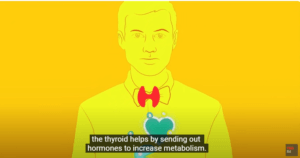
Thyroid Gland and Weight Gain
Your thyroid is part of your endocrine system, which is like the central command for hormones. And hormones? They’re the messengers telling your body’s systems how to function from minute to minute. Knowing your thyroid gland and weight gain connection leads to a better outcome.
Thyroxine (T4) and Triiodothyronine (T3)
What’s really crucial here are the hormones that the thyroid pumps out: thyroxine (T4) and triiodothyronine (T3). Think of them as the accelerators for your body’s engine. They set the pace for how fast your body burns through energy. 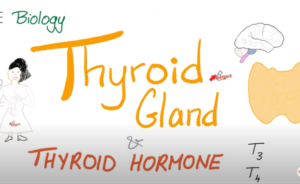
This is your metabolism at work. If your metabolism is revved up, you’ll burn more calories, even at rest. If it’s more of a Sunday drive, you’ll burn fewer.
Thyroid Regulates Bodily Functions
Now, this isn’t just about managing energy. The thyroid has its hands in regulating your body temperature, heart rate, and even how quickly you digest food. When someone’s thyroid gland is “on the fritz”, it’s like putting a speed limiter on your metabolism.
Link Between Thyroid and Weight Gain
If your thyroid is dialing back and not releasing enough hormones, this condition is known as hypothyroidism. This is where we encounter the often frustrating link between the thyroid and weight management.
Thyroid Gland on the Fritz
The phrase “on the fritz” is a colloquial expression that means something is not working properly. In other words it is malfunctioning, or is in a state of disorder. In the context of the thyroid gland, saying that the thyroid is “on the fritz” suggests that it is not functioning as it should.
The Thyroid is an Endocrine Gland
The thyroid gland is an essential endocrine gland located in the neck that produces hormones, primarily thyroxine (T4) and triiodothyronine (T3). These hormones regulate the body’s metabolism, energy levels, and weight. 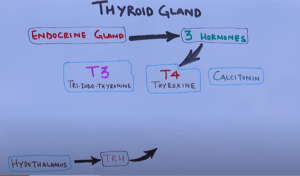
When the thyroid gland malfunctions, it leads to two main conditions:
1. Hypothyroidism:
This occurs when the thyroid gland is underactive and doesn’t produce enough hormones. Symptoms include fatigue, weight gain, cold sensitivity, dry skin, and constipation. 
2. Hyperthyroidism:
This happens when the thyroid gland is overactive and produces too much of the thyroid hormones. Symptoms include unintentional weight loss, rapid heartbeat, increased appetite, anxiety, and heat sensitivity. 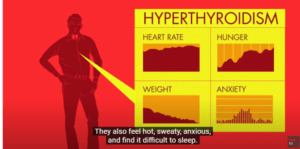
Both conditions will have a significant impact on a person’s weight and overall health. Hypothyroidism, in particular, is often associated with weight gain due to a slowed metabolism.
If you suspect your thyroid gland is “on the fritz” or not functioning properly, it’s essential to consult with a healthcare professional. They’ll perform blood tests to assess your thyroid hormone levels and determine if you have a thyroid disorder that requires treatment. The treatment may or may not include medication or other therapies.
My Thyroid Gland and Weight Gain
By my late thirties, I probably had tried all of the diets in the book. Weight Watcher’s, Jenny Craig, Slim Fast, Nutrisystem, you name it. I had also dabbled in the DASH diet and then on to the Lindora program . Each time, I was able to lose at least 20 pounds.
However, I always gained back more weight than I lost. I came to the conclusion that losing weight had to be a rocket science. Lucky for me, one of the staff members of the Lindora Clinic introduced me to a thyroid specialist. Bingo!
In 20/20 hindsight, I clearly understand how thyroid hormones work and why many people are unable to lose weight until their thyroid issues are addressed. This was one of the greatest revelations in my life, for sure. 
As a result, my doctor prescribed a medication to mediate my thyroid discrepancies. As I recall it was a synthetic brand. However, I was told that I did not have to be on it long-term. By the way, from what I understand, these synthetic forms are much cheaper that prescriptions.
As stated, I was only on them for a short amount of time. Being on a prescribed medication seemed to help me reach my weight loss goals. At least until I was able to figure out a few things.
The Beaver Medical Center
First, I joined a support group at the Beaver Medical Center in Redlands, California. It was the best thing that ever happened to me in terms of a successful weight loss program.
At Beaver I realized that I was not alone. We all had the same objectives – based around taking off pounds. It was basically set up like a classroom. We had an instructor, we took notes, receives advice on all things needed to lose weight.
Adapting to a New Lifestyle
Monitoring our food intake is key. Also, learning about the value of nutritious foods, reading food labels, and meal preparation were essentials elements for new beginners. We also swapped out the phrase “healthy lifestyle” for the word “diet” and that really made a lot of sense. At least for me. 
Elements of a Healthy Lifestyle
Water, Exercise and Sleep
The other components of my weight loss group was the importance of exercise, drinking enough water throughout the day, and getting an adequate amount of sleep. For many years, exercise and sleep really wasn’t a big deal for me.
Ironically, as I began to take my new lifestyle seriously, things begin to click. Before long, the weight was slowly coming off. Eventually I began to love riding my bike to work. Other times I jumped on my treadmill or took a long walk. Just make sure you have a comfortable walking shoe, OK? I also made sure to get as much sleep as possible, more than 7 hours most nights.
Small Changes Make a Big Difference
Needless to say, my whole system began to change for the better and, ironically, my thyroid problem ceased to exist. Of course, it didn’t happen overnight. So, making small changes in my lifestyle made a big difference in my weight loss mission, alongside of my thyroid medication.
If this story resonates with you, in terms of troubleshooting your weight loss barriers, who knows, you probably need to have a talk with your doctor. You could have a thyroid issue similar to what I experienced.
Synthroid for Thyroid Issues
Synthroid (levothyroxine) is a prescription medication used to treat hypothyroidism. This is a condition in which the thyroid gland does not produce enough thyroid hormones. 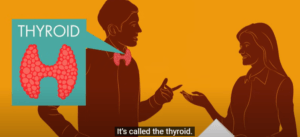
Levothyroxine
Levothyroxine is a synthetic version of the thyroid hormone thyroxine (T4). It plays a crucial role in regulating metabolism, growth, and development.
Synthroid
While Synthroid is not specifically designed for weight loss, it indirectly assists in weight management for individuals with hypothyroidism. Hypothyroidism leads to a slower metabolism, which causes weight gain or difficulty losing weight.
By replacing the missing thyroid hormones, Synthroid helps restore normal metabolic function. In turn, making it easier for patients to manage their weight.
Although many people with hypothyroidism typically need to take Synthroid long-term, their are other alternatives. The medication works by supplementing the body’s natural thyroid hormone levels. This allows the body to function normally.
However, the dosage needs to be adjusted periodically based on the patient’s thyroid hormone levels. This process is monitored through blood tests.
The Synthetic Process of Synthoid
The mechanism of action for Synthroid involves the synthetic T4. This synthetic is converted to the active thyroid hormone, triiodothyronine (T3), in the body’s tissues.
T3 then binds to thyroid hormone receptors in cells. It regulates various metabolic processes. In addition, it also regulates the body’s basal metabolic rate (BMR), which shows how efficiently the body burns calories. 
Weight Management Medications
Other medications used to treat hypothyroidism and assist in weight management include:
1. Liothyronine (Cytomel): A synthetic form of T3, which is sometimes used in combination with levothyroxine.
2. Natural desiccated thyroid (NDT): Derived from porcine (pig) thyroid glands, NDT contains both T4 and T3.
3. Liotrix (Thyrolar): A synthetic combination of T4 and T3.
Consult With Your Doctor First
It is important to note that while these medications help manage hypothyroidism and its associated symptoms, they should only be taken under the guidance of a healthcare provider.
Attempting to use thyroid medications for weight loss without a proper diagnosis of hypothyroidism is dangerous and leads to serious health consequences.
Thyroid Dysfunction Leads to Weight Gain
If you’ve been experiencing unexplained weight gain, it’s worth considering your thyroid gland as a potential player. The condition at the heart of this issue is called hypothyroidism. It occurs when your thyroid doesn’t produce enough hormones.
Slows Down Metabolism
This hormone insufficiency slows down your metabolism. This is the process by which your body converts food into energy. A slower metabolism means your body burns fewer calories at rest and during activity. This leads to weight gain.
Changes Bodily Functions
Because thyroid hormones are involved in so many bodily processes, hypothyroidism brings about a host of symptoms beyond weight issues. 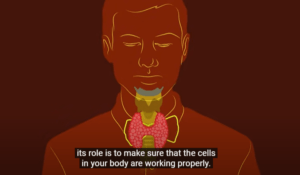
For Example, you might also notice:
- Fatigue
- Dry skin
- Hair loss
- A sensitivity to cold.
When your thyroid levels are off, it affects how other organs function. This is why these symptoms areso wide-ranging.
Understand the Cause
Weight gain from hypothyroidism is very frustrating. But I want you to know it’s not your fault. Understanding the cause is the first step in addressing it effectively. Now, let’s get ready to uncover how we pin down if your thyroid is actually the culprit. 
Diagnosing Thyroid-Related Weight Issues
If you’re worried that your thyroid is causing your weight gain, it’s time to talk about diagnosis. First and foremost, you’re going to need a healthcare provider to help pinpoint the problem.
Check-In With Your Primary Care Physician
The process typically begins with a physical exam and a review of your symptoms. Your doctor is likely to order blood tests to check levels of thyroid hormones such as thyroxine (T4) and thyroid-stimulating hormone (TSH).
Accurate diagnosis involve imaging tests like ultrasound or thyroid scans. This isn’t just about confirming hypothyroidism. It’s also about ruling out other conditions.
Testimonials Are Reassuring
Hearing from others is also reassuring, so I’ll share some anecdotes. Many have experienced relief and validation when their unexplained weight challenges were finally attributed to a thyroid condition. It was certainly a hallelujah for me.
Once a diagnosis is confirmed, your doctor will discuss treatment options with you. This is where the management of thyroid-related weight gain comes into play. In the next section let’s talk about weight management.
Managing Weight Gain
If you’re facing weight gain as a result of thyroid dysfunction, know that you’re not alone. There are ways to manage this challenge.
Prescription Medication
Often, the first line of attack is medication prescribed by your doctor to regulate thyroid hormone levels. This helps get your metabolism back on track.
Lifestyle Changes
Lifestyle changes play a crucial role too. Eating a balanced diet, engaging in regular physical activity, and getting enough sleep supports your overall health. It also helps with weight management. 
Supplements are Helpful
Supplements may be recommended by healthcare professionals to support thyroid health. However, but you should always talk to your doctor before starting any new supplement regimen.
Remember that the journey to a healthy weight is personal and is different for each individual. Adjust your approach as needed, but don’t get discouraged by setbacks.
Join a Support Group
Support groups, whether in-person or online, offer a sense of community and shared tips for managing thyroid-related weight issues.
Monitor Your Progress
Monitoring your progress with your healthcare provider is crucial to ensure your treatment plan is effective. You’ll be able to make any necessary adjustments over time.
Final Thoughts
While medication helps manage thyroid-related weight issues, it’s not the only solution. A comprehensive approach that includes lifestyle changes is crucial for long-term success.
This may involve:
- Adopting a balanced, nutrient-dense diet
- Engaging in regular physical activity
- Managing stress through techniques like meditation or yoga
- Getting enough quality sleep
Remember, weight management is a journey, and it’s essential to be patient and kind to yourself along the way.
When to Seek Further Help
If you’ve been diagnosed with a thyroid condition and are struggling to manage your weight despite treatment and lifestyle changes, it may be time to seek additional support. This could include working with a registered dietitian, a mental health professional, or an endocrinologist who specializes in thyroid disorders.
The Bottom Line
Thyroid issues can certainly contribute to weight gain, but they’re not the only factor at play. By working closely with your healthcare team, making sustainable lifestyle changes, and being proactive about your health, you can effectively manage your weight and feel your best.
Remember, every person’s journey is unique, and what works for one may not work for another. The key is to stay informed, stay committed, and never hesitate to reach out for help when you need it.
Founder, Rachele
(w) mybluegenes.com
(e)rachele@ mybluegenes.com
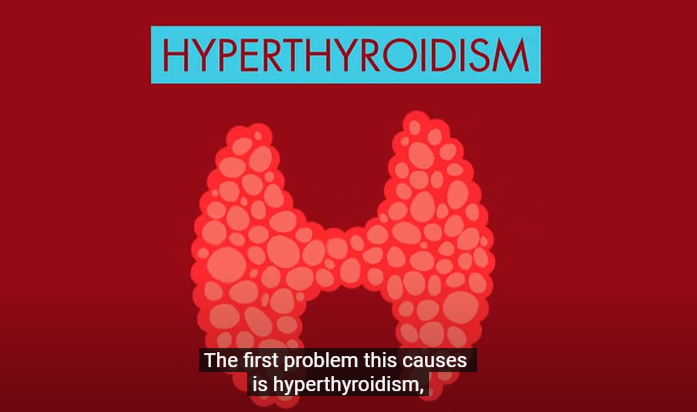



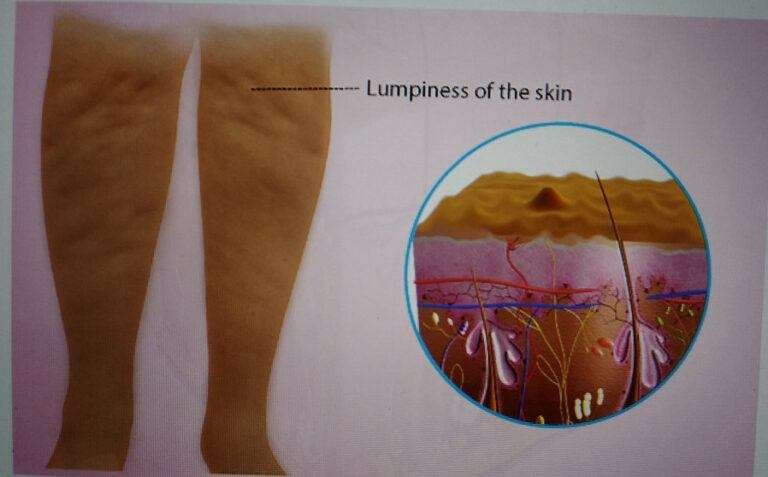


Some genuinely wonderful information, Sword lily I observed this. “Doctrine is nothing but the skin of truth set up and stuffed.” by Henry Ward Beecher.
Hi there, Conrad.
Great quote. Henry Ward Beecher is a great poet.
Have a wonderful weekend.
Rachele